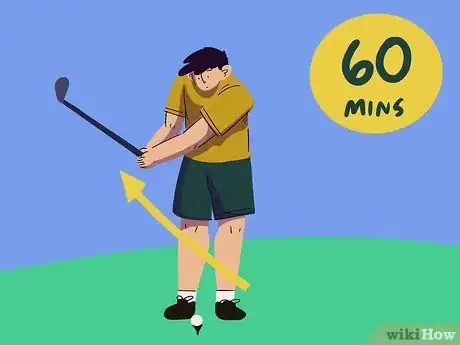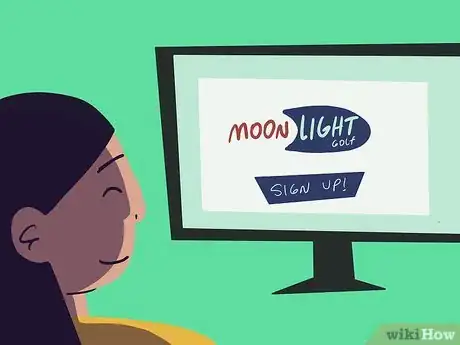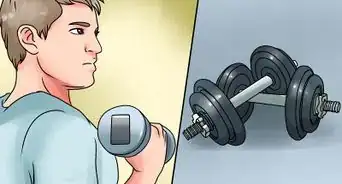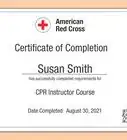This article was co-authored by wikiHow Staff. Our trained team of editors and researchers validate articles for accuracy and comprehensiveness. wikiHow's Content Management Team carefully monitors the work from our editorial staff to ensure that each article is backed by trusted research and meets our high quality standards.
There are 8 references cited in this article, which can be found at the bottom of the page.
This article has been viewed 74,678 times.
Learn more...
Becoming a professional golfer takes time, dedication, and perseverance. You will need to develop your skills through lessons and consistent practice. Finding a reliable golf partner or joining a local golf club can help you get the experience you need to go pro. Once you’ve honed your skills, you will need to participate and excel in both amateur and professional tournaments to become a professional golfer.
Steps
Developing Your Skills
-
1Start playing as early in life as possible. If you or someone you know has dreams of becoming a professional golfer, it’s important to get started as soon as possible. If you are a child or teenager, don’t wait until you are an adult to begin fulfilling your dreams. If you are an adult, begin playing today.[1]
- The sooner you begin playing golf, the sooner you can reach your goal of becoming a professional golfer.
-
2Take golf lessons. Even if you’ve been playing golf for years, you can still benefit from golf lessons. Lessons offer an opportunity to hone particular skill sets and get feedback from your instructor. Try taking golf lessons at your local golf course, or even signing up for a class through your high school or local college.[2]
- Ask friends, family, and other golfers for suggestions on great golf instructors.
- Check out what types of lessons your local country club or golf course offer.
Advertisement -
3Develop a consistent routine for practicing on the golf course. To become a professional golfer, you must play golf regularly. Dedicate time to practicing your short game and putting, as well as hitting fairways and greens.[3]
- Begin by dedicating 10 hours per week playing golf on a golf course, in a variety of settings.
- Work your way up to 20 hours per week of golf practice.
-
4Master multiple skills. To become a professional golfer, you will need to work on specific skills that will help you reach the peak of your performance. You will need to master putting, bunker, full swing, chip, pitch, lob, and approach wedge skills.
- Try to work on each individual skill during golf lessons, incorporating the feedback from your instructor.
-
5Dedicate ample time to each golfing skill. While it’s important to spend as much time on the golf course as possible, it is equally important that you dedicate time to each specific skill. Doing so will ensure you develop a wide range of skills to your fullest potential.
- Set equal time aside each week to work on putting, bunker, full swing, chip, pitch, lob, and approach wedge skills.
- Begin with dedicating 1 hour weekly to each specific skill, and work your way up to 3 hours weekly per skill.
-
6Build your mental skills. Becoming a professional golfer means working on mental skills as well as physical ones. Embrace challenges you encounter, and stay focused on the process rather than the result. Stay in the present when you’re on the golf course, and don’t be too hard on yourself when you make a mistake.[4]
- Most importantly, you must fully believe in yourself and your ability to master the game.
- Let your confidence guide your game.
Finding Opportunities to Play
-
1Find a reliable golfing partner. Becoming a pro means you need to hone your skills through individual effort, as well as through competition with others. Finding someone you can play golf with regularly will help you become a better golfer and speed up your journey down the professional path.[5]
- Ask a friend or family member if they will dedicate time each week to playing golf with you.
- You can also post in online forums or use an app like Golf Match to find a local partner
-
2Join your local golf club. There are many benefits to joining a local golf club. In addition to getting experience, you will make connections with other golfers in your area. Joining a local club may also lead to invitations to participate in the club’s tournament program, providing you with opportunities to compete in local and regional tournaments.
-
3Play golf in college. Playing golf while you’re a college student will provide you with invaluable experience. It can also help pay for your education through scholarships. If you can’t play on your university or college team, consider playing intramural or club golf as a college student.[6]
-
4Compete in amateur tournaments. Take advantage of opportunities to play in local, regional, and national amateur golf tournaments. These tournaments will give you competitive experience. Playing in amateur tournaments will also provide you with an opportunity to become known in particular golf circuits, which will come in handy as your golf career progresses.
- Some amateur tournaments to consider include the USGA Amateur Championship and USGA Amateur Public Links Championship.
Going Pro
-
1Compete in multiple professional golf tournaments. Try to play in as many professional tournaments as your budget and schedule allow. This will give you experience as well as exposure to other professional golfers and potential sponsors. Some tournaments to consider include the Moonlight Tour, NGA Pro Golf Tour, and the eGolf Professional Tour.[7]
- You can enter the eGolf Professional Tour by signing up on their website: http://www.egolfprofessionaltour.com/.
-
2Play in the PGA Tour Qualifying Tournament. This tournament, also known as Qualifying School or Q School, is played in 4 sequential stages. Players qualify for the stages sequentially, with only 144 players making it to the final stage. After the final stage, the top 25 players will qualify for the Web.com tour.[8]
- You can find get information on the qualifying tour processes and registration here: https://qualifying.pgatourhq.com/.
-
3Earn your PGA tour card. After you qualify for the Web.com Tour via Qualifying School, you will need to earn your PGA Tour Card to become a true professional golfer. You can do this by winning any 3 events on the Web.com Tour. You can also earn the card by finishing in the top 25 in total earnings for the regular season of Web.com.[9]
References
- ↑ https://golftips.golfweek.com/start-professional-golf-career-20219.html
- ↑ https://practical-golf.com/golf-lessons-guide/
- ↑ https://golftips.golfweek.com/start-professional-golf-career-20219.html
- ↑ https://www.golfdigest.com/story/rotella
- ↑ https://www.golf.com/tour-and-news/golfmatch-app-takes-awkward-pairings-out-amateur-golf
- ↑ http://www.golfhq.com/blog/playing-college-golf/
- ↑ https://golftips.golfweek.com/start-professional-golf-career-20219.html
- ↑ https://www.ussportscamps.com/tips/golf/todays-pga-qualifying-getting-a-pga-tour-card
- ↑ https://www.ussportscamps.com/tips/golf/todays-pga-qualifying-getting-a-pga-tour-card
About This Article
To become a professional golfer, try to practice golfing as much as possible to hone your skills. You can play golf on the weekends, join a golf club, play golf on a college team, or compete in amateur tournaments to become a better golfer. Then, once you're good enough, you can start competing in professional tournaments to get your name out there and meet potential sponsors. Eventually, if you compete in the PGA Tour Qualifying Tournament and are one of the top 25 players, you'll earn your PGA tour card and become an official professional golfer. For advice on how to train to become a professional golfer, keep reading!








































































